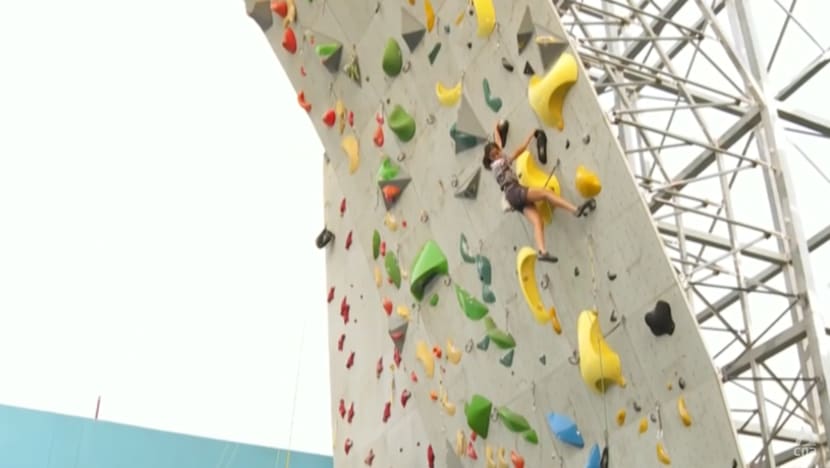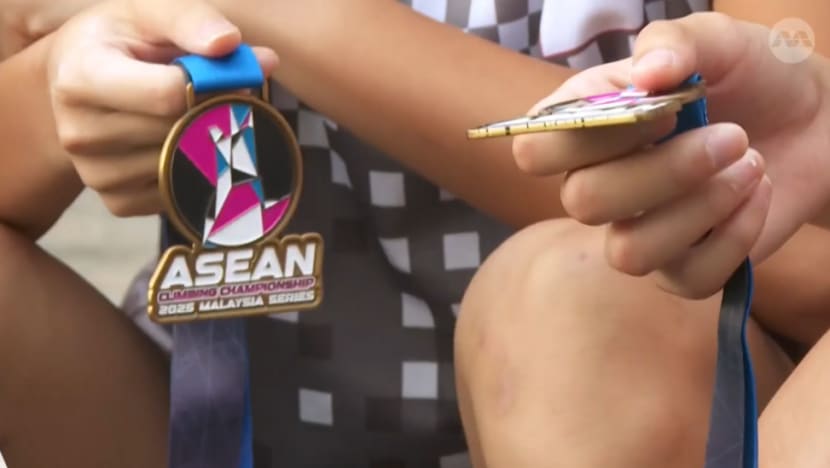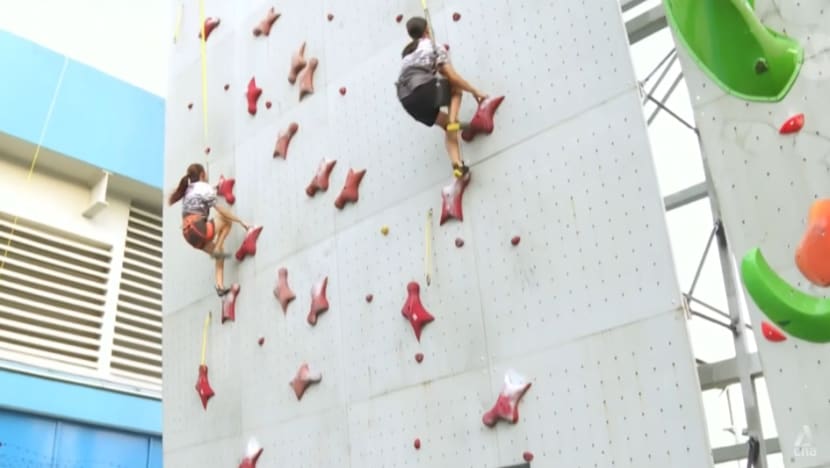National climbing team eyes SEA Games podium after topping table at ASEAN Championship
National coach Jay Koh said recent efforts to step up training and grow local interest is reaping results.

National climber Natalie Goh ascends a wall. The 18-year-old says she is looking forward to her SEA Games debut this December in Bangkok.

This audio is generated by an AI tool.
SINGAPORE: National climber Natalie Goh has been scaling walls since she was nine, after falling in love with the sport during a family trip to a climbing gym.
She started competing in primary school, specialising in lead climbing and bouldering.
Now, the 18-year-old is now among Singapore’s best climbers, helping Team Singapore top the medal tally at the ASEAN Climbing Championship.
She bagged first place in the women's lead event at the Kuala Lumpur meet last month.
“I was quite happy to get the gold because there were a lot of other strong climbers. So for me, that's something quite big,” she told CNA.
Overall, Team Singapore secured a haul of 29 medals – nine gold, nine silver and 11 bronze.
Goh and her teammates now have their eyes set on the next major event – the SEA Games in Bangkok in December – where they are aiming to bring home at least four medals.
"I'll be training every day. I hope to train three times in a day,” the Republic Polytechnic student told CNA, adding she is looking to defer some school modules to focus more time on training.
“SEA Games will definitely be of a higher standard because there will be a lot more (competitors).”
National coach Jay Koh said recent efforts to step up training and grow local interest is reaping results.
“Our climbers, especially the female side – they’re pretty good in bouldering as well as speed,” he added.
“At the end of the day, the Indonesians are still at the top. They have world-class standards. But we are gradually getting there because we have a system in place.”
SCALING UP EFFORTS
To speed up development, the national sport climbing body has made improvements to its facilities, including a new wall to train its lead climbers.
The discipline requires athletes to make their way up a wall over 15m high, clipping their climbing rope to safety anchors as they ascend. At competitions, they are given 6 minutes to look at the wall and determine potential routes before climbing.
Routes at the national climbing centre’s new wall are set to competition standards – much more advanced than commercial gyms. They are refreshed quarterly so athletes have ample opportunities to try different grades of technical difficulties.
Aside from lead, there are two other formats for sport climbing – speed and bouldering.
In the boulder event, climbers navigate 4.5m walls without ropes, aiming to complete in the shortest time and fewest attempts.
For speed climbing, athletes race up a 15m wall in one-on-one knockout rounds.
To help the local team get speedier, the Singapore Sport Climbing and Mountaineering Federation engaged Ukrainian speed climber Danyil Boldyrev as a consultant. The 33-year-old has won multiple World and European Championships.
“We have been getting him at least once or twice a year to train our speed team,” said the sport body’s general manager Rasip Isnin.
“We’ve seen much progress in our speed athletes – from about 7 seconds, now they are hitting 5.4 seconds. Our target is to get them to hit 5.2 seconds and below for them to win a medal in the upcoming SEA Games.”

Athletes will also be sent on overseas training stints in Japan, a powerhouse in sport climbing which has produced world champions and Olympians.
“We’re also looking at areas where we can send them for a little bit more exposure,” said Koh.
“(For example) competition simulations, whereby they can really test themselves. It's basically like going for a lot of preliminary exams so that they are well prepared for the actual test itself, such as the SEA Games (and beyond).”
GETTING MORE POPULAR
Koh said the inclusion of the sport in the Summer Olympic Games has also spiked interest in recent years.
Sport climbing made its Olympic debut at the Tokyo Games in 2020 with just one overall medal per gender.
In Paris in 2024, speed was a standalone event while lead and bouldering were combined.
Climbers are counting down to the 2028 edition in Los Angeles, where all three categories will be contested separately.

The national coach added that as more climbing gyms open in Singapore, the sport has been made more accessible to the public.
“All these have helped to enlarge our (talent) pool. Local competitions have increased over the last two years as well. This has generated more and more interest within the younger age groups, especially between eight and 12,” said Koh.
The key climbing event in Singapore is the federation’s annual national championship, Climb One, which serves as a platform to select athletes into the national team.
Another major competition is the Singapore National Boulder League, which saw total participation of 2,500 across its youth and senior circuits in its inaugural run last year.
There are now more than 40 athletes on the national team, up from about 30 last year.
The climbing fraternity wants to keep the momentum going, hoping for success in longer-term goals like next year’s Asian Games and Youth Olympics.
It hopes to build a strong team for the home crowd when Singapore hosts the SEA Games in 2029.
















